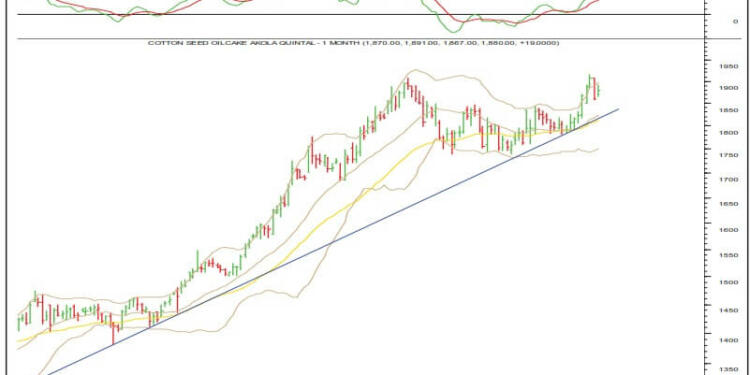National Commodity & Derivatives Exchange Limited is an online commodity exchange based in India. It has an independent Board of Directors and professional management, who have interest in commodity markets. It provides a commodity exchange platform for market participants to trade commodity derivatives. It is a public limited company, incorporated on 23 April 2003 under the Companies Act, 1956.
It obtained its Certificate for Commencement of Business on 9 May 2003, and began operations on 15 December 2003. NCDEX is the only commodity exchange in the country promoted by national institutions. NCDEX is regulated by the Forward Markets Commission, and is subject to the Companies Act 2013, Stamp Act, Contracts Act, Forward Commission Act, and various other laws.
This exchange also facilitates deliveries of commodities through a network of over 594 accredited warehouses through eight warehouses service providers, with holding capacity of around 1.5 million tones. It offers average deliveries of 1 lakh MT at every contract expiry. Average delivery ratio for Q1 of 2013-14 is 98%.
NCDEX offerings
NCDEX has offices in Mumbai, Delhi, Ahmedabad, Indore, Hyderabad, Jaipur, and Kolkata. Products and services NCDEX offer futures trading in 31 agricultural and non-agricultural commodities. NCDEX also offers as an information product, an agricultural commodity index.
Also Read : Unmissable Telugu movies on Netflix : Best 10
Cotton seed problem
NCDEX Cotton Seed Despite occasional price restraint in futures and online gains since the beginning of April this year, the continuing Cotton seed oil pie futures contract on the National Commodity Derivatives Exchange (NCDEX) has surpassed the critical resistance level of Rs2,500. Prices are above the moving averages of 21 and 50 days, indicating strong momentum.
Despite the steep drop in prices since July, cotton oil closed the year 8 percent lower. This matter was brought into attention by Sudhir Agrawal, coordinator of All India Cotton Seed Oil Industries Association (AICISIA). Although the cotton market will continue to be dominated by bullish fundamentals in the coming weeks, the upward trend remains capped as rising prices discourage haggling for fresh trades.
While prices for cotton seeds and oilcakes are driving up the pace of raw cotton production, the near-term outlook remains gloomy. The August cotton pie contract on the NCDEX traded between 2118 Rupees and 2215 Rupees this week, down 5 points from last week. Prices for CBOT are still higher than in September 2011, despite the decline in the cotton pie.
Expectations of a sharp increase in cotton production have pushed down prices for cotton seeds and oilcakes in recent months. Traders are not expecting major price movements this week due to stable demand. As a result, the global stock-to-consumption ratio is expected to be lower than three years ago, which means that cotton prices are expected to remain below recent levels.
Due to higher production, the price of cotton oilcake will not fall as other alternatives are traded at higher prices. Edible oil prices will remain stable in the short term and I expect the upward trend in cotton washing oil prices to continue. As with other oilcakes, the price of cotton seeds cakes depends on the production dynamics of the primary source, in this case cotton kapas. Price substitutes such as guar churri, pulses churri, rapeseed, mustard seed flour and others have an impact on demand for cotton oil cakes, but are not a major price driver. On the domestic market, there was a sharp fall in the price of edible oils during the festival.
The National Commodity Derivatives Exchange Ltd (NCDEX) announced the launch of its cotton seed futures contract today. NCDEX has issued its first industrial-grade cotton seed futures contract, the exchange said in a statement. The contract specifications for the forward contract are: Industrial Grade Cotton Seeds. The list includes chickpeas, chana, cotton seeds, oilcake, guarseeds, jaggery, gur, cumin, jeera, pepper, mustard & the likes. Refined soybean oil stood at Rs 685 crore, making it the most traded agricultural derivatives contract in the country in April.
The stock exchange delivered 44,646 tons of the raw material in April, an increase of 4.358 percent year-on-year. Market participants said rising attendances and rising demand from livestock feed producers were affecting prices for cotton seed oil and cakes.
SEBI’s take on the matter
SEBI examines the quality of coriander traded on the NCDEX exchange. A trader filed a written complaint with the NCDEX in mid-July about the quality of the coriander traded on the exchange. The Securities and Exchange Board of India (SEBI), India’s capital and commodities regulator, has launched an investigation into the quality of cotton seed cakes and coriander following complaints from traders and lobbies.
The regulator has collected samples of cotton seeds and oilcakes from various warehouses in Rajasthan and Gujarat. Indian cotton oil cake (kapaskhali) is a cotton seed product used as animal feed in the northwestern states of India.
Read More : Dehli Mukhyamantri Vigyan Pratibha Pariksha Scheme
























